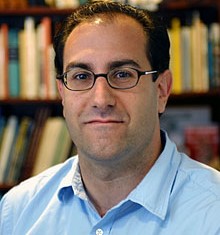
- This event has passed.
12th Annual Ina & Lewis Heafitz Endowed Lecture: Centering Indigenous Peoples & Nations in Land Protection & Conservation
August 25, 2022 @ 4:00 pm - 5:30 pm
 In this year’s Ina and Lewis Heafitz Endowed Lecture, Dr. Darren Ranco will explore the opportunities for Wabanaki-led conservation in what is now Maine. He will share contemporary scholarship about Indigenous conservation practices, define the terminology used by Indigenous people for conservation work, and identify best practices for partnerships with environmental organizations and Indigenous peoples. Dr. Ranco will describe his efforts to develop a proactive, coordinated response to save the culturally and artistically essential brown ash tree from the invasive emerald ash borer, and how this collaborative work is leading to new strategies for informing public policy and establishing effective methods of bringing together diverse groups to address environmental threats.
In this year’s Ina and Lewis Heafitz Endowed Lecture, Dr. Darren Ranco will explore the opportunities for Wabanaki-led conservation in what is now Maine. He will share contemporary scholarship about Indigenous conservation practices, define the terminology used by Indigenous people for conservation work, and identify best practices for partnerships with environmental organizations and Indigenous peoples. Dr. Ranco will describe his efforts to develop a proactive, coordinated response to save the culturally and artistically essential brown ash tree from the invasive emerald ash borer, and how this collaborative work is leading to new strategies for informing public policy and establishing effective methods of bringing together diverse groups to address environmental threats.
Please note that the day after this event, registration will open for access to an online recording of the program.
The Ina and Lewis Heafitz Endowed Lecture celebrates leading thinkers in horticulture, landscape design, sustainability, and more. These nationally-recognized speakers address cutting-edge and timely topics, presenting enriching talks centered around their work in nature-related fields. The annual lecture is free for all.
Darren J. Ranco, PhD, a citizen of the Penobscot Nation, is an Associate Professor of Anthropology and Chair of Native American Programs at the University of Maine. He has a Masters of Studies in Environmental Law from Vermont Law School and a PhD in Social Anthropology from Harvard University. His research focuses on the ways in which indigenous communities in the United States resist environmental destruction by using indigenous science, diplomacies, and critiques of liberalism to protect natural and cultural resources. He teaches classes on indigenous intellectual property rights, research ethics, environmental justice and tribal governance. As a citizen of the Penobscot Nation, he is particularly interested in how better research relationships can be made between universities, museums, Native and non-Native researchers, and indigenous communities.
